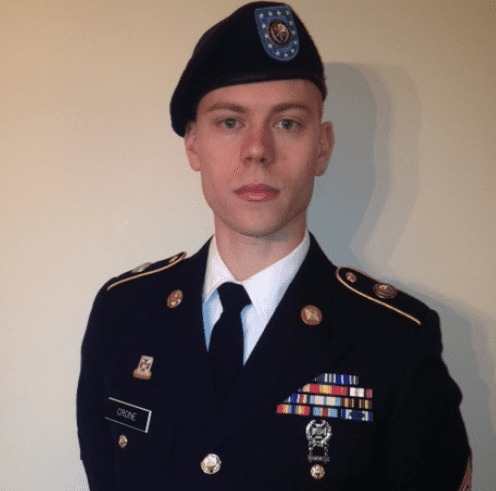‘Exceptional’ veteran receives graduate assistantship for Mathematical Finance

In 2014, Tyler Crone spent nine months in Bagram, Afghanistan, overseeing computer hardware networks and software systems handling highly sensitive data during Operation Enduring Freedom. This fall, he will report to the Center City Campus of the University of North Carolina at Charlotte to begin his graduate education, thanks to university financial support earmarked for military veterans. The funding, called a graduate assistantship, requires recipients to serve a number of hours each week working under the guidance of a faculty member on research projects or teaching duties.
Crone served six years in the Army Reserves in financial management. His responsibilities in Afghanistan involved extensive travel, and he was posted to six different operation bases in country. After returning from overseas, Crone taught high school computer science for several years. Now he will join the top-ranked Master of Science in Mathematical Finance program at the Belk College of Business with the aim of working in the finance industry as a quantitative analyst. Crone credits his military experience with engraining in him persistence and dedication. He said, owing to his Army service, “I know what it means to sacrifice for the greater good of an organization.” Crone said the Graduate School funding support allows him to make the transition from his teaching position to advanced learning. “This assistantship will allow me to continue helping others while improving my own abilities by attending university full time,” he said. “I was thrilled to be offered a teaching assistantship working with undergraduate students.”
Crone is one of three military veterans who were awarded a graduate assistantship by UNC Charlotte’s Graduate School this year. Each year, the Graduate School gives three 2-year awards to cover tuition and health insurance and provide a monthly stipend. They are valued at $36,000 for master’s degree candidates and $45,000 for doctoral candidates. Crone was selected along with two others by a panel of judges in a competitive process from a pool of veterans accepted into UNC Charlotte graduate programs for fall 2016. The program began in 2015 when the first three military veterans were awarded assistantships; one of those veterans completed her master’s degree this summer, and two will enter their second year of master’s degree programs this fall.
Dean Tom Reynolds of the Graduate School, a U.S. Navy veteran of the Vietnam War, believes the program is proving successful and fulfilling its aims. “These veterans served and sacrificed,” Reynolds said. “We’re recognizing their contributions by supporting their higher education goals. But we have a selfish motive, too,” he added. “We want to attract these exceptional men and women to Charlotte with the hope that they will remain here. The skills they acquired in the military, coupled with outstanding graduate education, make them exceptionally valuable to our community.” Reynolds notes that the university began as the Charlotte Center in 1946 to meet the higher education needs of returning World War II veterans. “We’re carrying on that worthy tradition,” Reynolds said.
Roughly 200,000 military members are separating from service each year. A recent report by the Institute for Veterans and Military Families (“Work after Service: Developing Workforce Readiness and Veteran Talent for the Future”) cited the valuable skills veterans bring to the workplace, such as leading teams, supervising, developing subordinates, planning, professionalism and problem solving. However, the report also stressed the importance of service members maximizing their educational opportunities and acquiring higher education credentials. UNC Charlotte works closely with regional military installations and veteran organizations such as USO North Carolina and Charlotte Bridge Home to take a holistic view toward outreach to and support for veterans, especially veterans in transition from service to the civilian sector. Although UNC Charlotte can address veterans’ higher education needs, partner agencies help support veterans in areas such as housing, spouse employment, job skill training, medical needs and recreation.
Read more about all of the veterans receiving graduate assistantships on Inside UNC Charlotte.